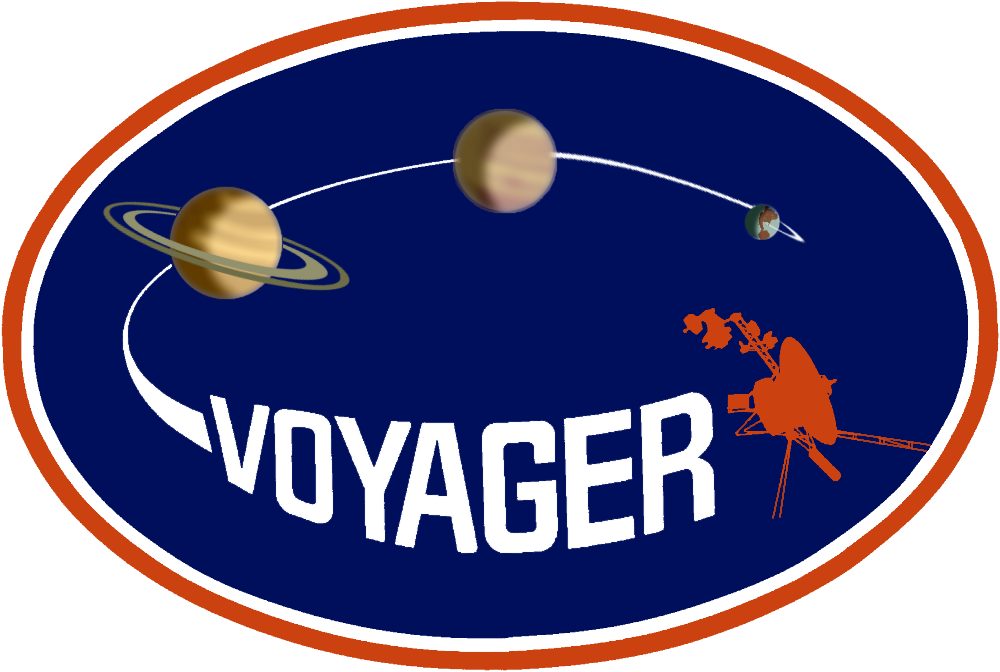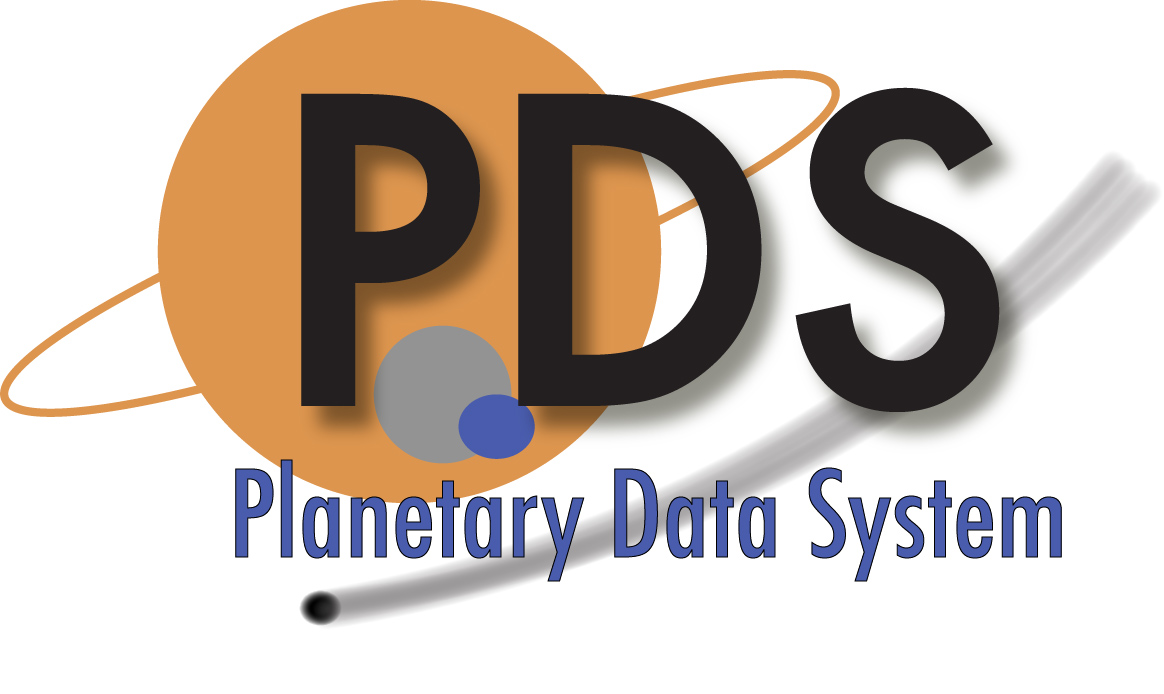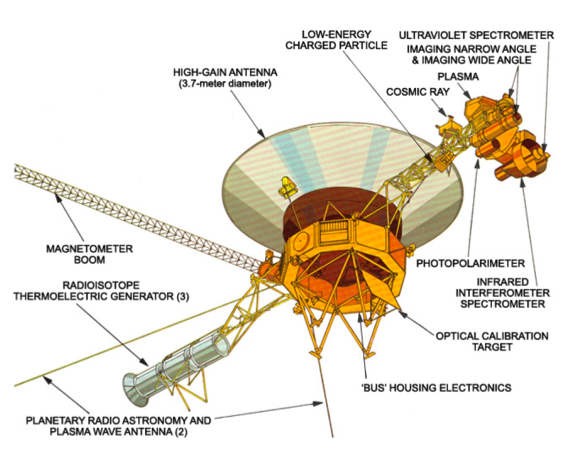- Determination of atmospheric vertical thermal structure (which in turn aids modeling of atmospheric dynamics).
- Measurement of the abundances of hydrogen and helium (as a check on theories regarding their ratio in the primitive solar nebula).
- Determination of the balance of energy radiated to that absorbed from the sun (to help investigate planetary origin, evolution, and internal processes).

Instrument Characteristics
The Voyager IRIS instrument consists of a Michelson interferometer for measurements in the thermal infrared and a single channel radiometer that operates in the visible and near infrared. The two components of the instrument share a 50 cm Cassegrain telescope with an effective focal length of 303.5 cm. The angular field of view is 0.25 degree.
IRIS Science Objectives
References Helpful in Scoping the Mission
Mission Description
Spacecraft Description
Spacecraft Description
The IRIS Data
Instrument Description
The Reduced Data Records (RDR) for Jupiter contains measurements from both the infrared interferometer spectrometer and the broadband reflected solar radiometer and ancillary data. The data is ordered by time as measured by the Flight Data System Count (FDSC). And includes pointing and other information on the geometry associated with a given data record.
A separate explanatory file is included for each planet: Jupiter, Saturn, Uranus, and Neptune. Included are information on the reduction and calibration of the data sets, brief discussions of the data quality, and a list of relevant references.
Jupiter
Calibrated Data - Voyager 1 and 2 Derived Data - Voyager 1 and 2
Saturn
Calibrated Data - Voyager 1 and 2 Derived Data - Voyager 1 and 2
Titan data is included in the Saturn data file
Calibrated Data - Voyager 1 and 2
Uranus
Calibrated Data - Voyager 2
Neptune
Calibrated Data - Voyager 2
Citing the data
Publications - A listing of team members to facilitate literature searches.
Observation geometry in "SPICE" format may be obtained at the NAIF node
Other Documentation
A separate explanatory file is included for each planet: Jupiter, Saturn, Uranus, and Neptune. Included are information on the reduction and calibration of the data sets, brief discussions of the data quality, and a list of relevant references.
Jupiter
Calibrated Data - Voyager 1 and 2 Derived Data - Voyager 1 and 2
North-South Scans
Red Spot Parameters
Saturn
Calibrated Data - Voyager 1 and 2 Derived Data - Voyager 1 and 2
North-South Scans
Titan data is included in the Saturn data file
Calibrated Data - Voyager 1 and 2
Voyager 1, the close encounter, spans 1980-08-27 to 1980-11-15
Voyager 2 spans 1981-06-24 to 1981-08-25
Voyager 2 spans 1981-06-24 to 1981-08-25
Uranus
Calibrated Data - Voyager 2
Neptune
Calibrated Data - Voyager 2
PDS recommendations for citing data sets can be found here.
Jupiter
Conrath, B.J., (1995), VG1/VG2 Jupiter IRIS Data Archive V1.0, PDS Atmospheres (ATM) Node, https://doi.org/10.17189/8dz7-vn28
Conrath, B.J., (1995), Voyager 1 and 2 Jupiter IRIS Derived North/South Parameters V1.0, PDS Atmospheres (ATM) Node, https://doi.org/10.17189/3xk8-aj56
Conrath, B.J., (1995), VG1/VG2 Jupiter IRIS Derived Great Red Spot Parameters V1.0, PDS Atmospheres (ATM) Node, https://doi.org/10.17189/vbzd-a125
Saturn
Conrath, B.J., (1995), VG1/VG2 Saturn IRIS Data Archive V1.0, PDS Atmospheres (ATM) Node, https://doi.org/10.17189/70n4-zx85
Conrath, B.J., (1995), Voyager 1 and 2 Saturn IRIS Derived North/South Parameters V1.0, PDS Atmospheres (ATM) Node, https://doi.org/10.17189/3bgw-mp80
Uranus
Conrath, B.J., (1995), Voyager 2 Uranus IRIS Data Archive V1.0, PDS Atmospheres (ATM) Node, https://doi.org/10.17189/fec9-4c64
Neptune
Conrath, B.J., (1995), Voyager 2 Neptune IRIS Archive V1.0, PDS Atmospheres (ATM) Node, https://doi.org/10.17189/3xk8-aj56
Jupiter
Conrath, B.J., (1995), VG1/VG2 Jupiter IRIS Data Archive V1.0, PDS Atmospheres (ATM) Node, https://doi.org/10.17189/8dz7-vn28
Conrath, B.J., (1995), Voyager 1 and 2 Jupiter IRIS Derived North/South Parameters V1.0, PDS Atmospheres (ATM) Node, https://doi.org/10.17189/3xk8-aj56
Conrath, B.J., (1995), VG1/VG2 Jupiter IRIS Derived Great Red Spot Parameters V1.0, PDS Atmospheres (ATM) Node, https://doi.org/10.17189/vbzd-a125
Saturn
Conrath, B.J., (1995), VG1/VG2 Saturn IRIS Data Archive V1.0, PDS Atmospheres (ATM) Node, https://doi.org/10.17189/70n4-zx85
Conrath, B.J., (1995), Voyager 1 and 2 Saturn IRIS Derived North/South Parameters V1.0, PDS Atmospheres (ATM) Node, https://doi.org/10.17189/3bgw-mp80
Uranus
Conrath, B.J., (1995), Voyager 2 Uranus IRIS Data Archive V1.0, PDS Atmospheres (ATM) Node, https://doi.org/10.17189/fec9-4c64
Neptune
Conrath, B.J., (1995), Voyager 2 Neptune IRIS Archive V1.0, PDS Atmospheres (ATM) Node, https://doi.org/10.17189/3xk8-aj56
Publications - A listing of team members to facilitate literature searches.
Observation geometry in "SPICE" format may be obtained at the NAIF node
 PDS: The Planetary Atmospheres Node
PDS: The Planetary Atmospheres Node


